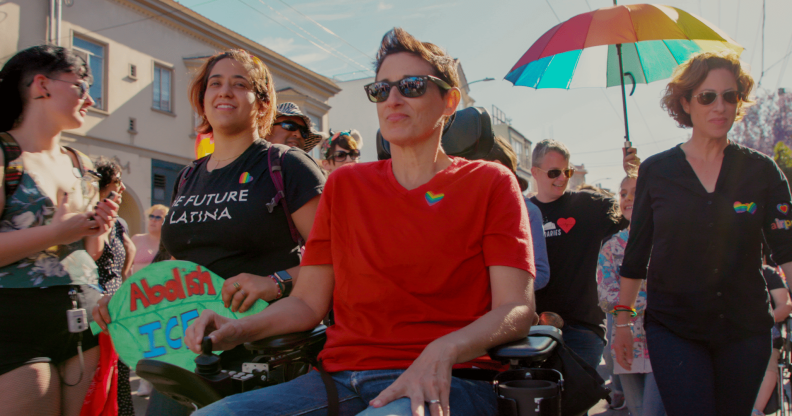How a newly-out divorcee living in her car created a home for a generation of lesbians

Franco Stevens at the 2019 Dyke March.
In 1989, Franco Stevens was a newly out, recently divorced lesbian working three jobs and living in her car.
She was lost, and walked into the A Different Light bookstore in San Francisco looking for something that would help her find her way.
“We didn’t have the internet back then,” she tells PinkNews.
“People really felt alone. I know that that’s still a thing, you know, people definitely feel alone today. But back then, you could have another queer person living a mile away and think that you’re completely all alone, because there’s nobody like you.”
Stevens explains that she went into the bookstore “looking for this magazine that I thought must definitely exist, something to tell me where to go and what to do, and how to meet other people like myself”.
Only, such a thing didn’t exist.
“I thought, ‘Oh, somebody should definitely do that’,” Stevens says. “And then one day, it was like I was hit with a baseball bat, I was like, ‘Oh, yeah, duh! It’s supposed to be me. I’m supposed to do this.”
Somehow, at 23 years old with no experience, Stevens managed to create Deneuve (later renamed Curve), the longest-running lesbian magazine in history.
Three decades on, Ahead of the Curve, a documentary about Stevens’ incredible journey, the impact of the iconic magazine on generations of lesbians, and the future of queer activism, has arrived.
Franco Stevens created a community for lesbians who were completely ‘alone’
When the first issue of the magazine came out in 1990, the fact it had the word “lesbian” on the cover caused a stir.
“It was really controversial, even from within the community,” Stevens says. “No one had ever done that. People thought it was a death sentence for the magazine.”
In reality, queer women across the United States finally found what they had been looking for, the same thing Stevens had been looking for when she first entered that San Francisco bookshop.
“We would do profiles on everyday people doing great things in our community, showing that you don’t have to act a certain way, dress a certain way and have a specific job in order to be accepted in the lesbian community,” she explains.

Franco Stevens interviews women at MichFest.
Curve magazine now exists as The Curve Foundation, a philanthropic organisation which aims to “empower lesbian, queer women, trans women, and non-binary people to share our culture and our stories, connect with each other, and raise visibility”.
The film sees Stevens make an effort to be honest about her own experiences, but also about the future of Curve and queer activism.
At one point, she admits: “Maybe a print magazine isn’t needed anymore, maybe I fulfilled that mission, but giving a voice to the LGBT+ community? That mission is not accomplished. Having equal rights is not accomplished.”
“Our work isn’t done,” she tells PinkNews. “There are so many anti-LGBT+ laws. We can’t walk down the street safely. We can’t be free and open to love who we love. Why is it still a big deal?”
She recalls: “I used to do this radio talk show back in the 90s, and we’d always have these very homophobic callers. I’m sorry, but they were all men.
“And, you know, it just kind of dawned on me that the people that hate us the most, fear it in themselves.”
As anti-trans lesbians have become more vocal in recent years, especially among older generations who may well have read Curve in its heyday, Stevens’ decisive stance on trans-inclusion is powerful.
“I think that love is what makes life worth living,” she says.
“And, you know, that’s true for everybody. We have so much work to do, why spend it hating on other marginalised people?
“I mean, it is what history is, the marginalised people feel they have to marginalise somebody else, so they’re not at the bottom of the ladder… but trans kids, they need the most support.
“You know, if you identify as lesbian, you can remember what it’s like to grow up being different, or coming out and feeling different.”
Curve creator wants her story to show that ‘one person can make a difference’
Ahead of the Curve is co-directed and co-produced by Stevens’ wife Jen Rainin, who felt that the story needed to be told.
“I had to be OK with her digging really deep into the good, the bad, the ugly parts of my life,” Stevens says.
“I’m a really private person… but I just was like, ‘Okay, everything’s fair game, if I’m going to help anybody, I need to start by being honest.”
Through telling her story and meeting with younger activists to discuss the future of queer visibility and LGBT+ rights, Franco Stevens is clear that “one person can make a difference”.
She adds: “I’m a disabled Jewish woman, trying to make a change in the world, and I was homeless.
“You know, things haven’t always been easy… But I felt marginalised and I started a magazine as a kid to get the resource that I wanted.
“One person can make a difference in the movement. There’s a lot of excuses, like, ‘Oh, I don’t have the money’, ‘I don’t have the time’, ‘I don’t have the knowledge’.
“Making a difference in the world can just start by being your authentic self, sharing who you are with everybody in your life. That’s huge.”
Ahead of the Curve will be released in UK cinemas on 4 June.
Watch an exclusive clip below:

